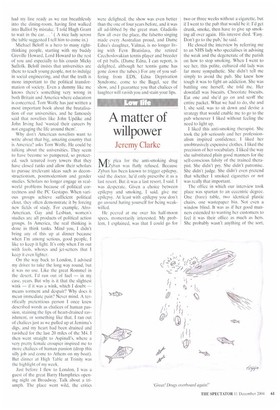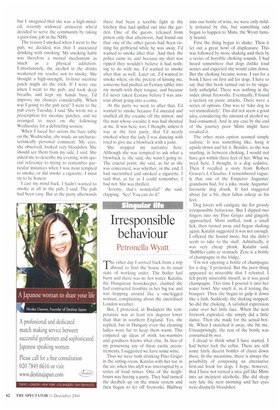A matter of willpower
Jeremy Clarke
My plea for the anti-smoking drug Zyban was flatly refused. Because Zyban has been known to trigger epilepsy, said the doctor, he'd only prescribe it as a last resort. But it was a last resort, I said. I was desperate. Given a choice between epilepsy and smoking, I said, give me epilepsy. At least with epilepsy you don't go around hating yourself for being weakwilled.
He peered at rue over his half-moon specs, momentarily interested. My problem, I explained, was that I could go for two or three weeks without a cigarette, but if I went to the pub that would be it: I'd get drunk, smoke, then have to give up smoking all over again. His interest died. 'Easy. Don't go to the pub,' he said.
He closed the interview by referring me to an NHS lady who specialises in advising the weak and the degenerate of the parish on how to stop smoking. When I went to see her, this polite, cultured old lady was far more sympathetic. She didn't tell me simply to avoid the pub. She knew how tough it was to fight an addiction. She was battling one herself, she told me. Her downfall was biscuits. Chocolate biscuits. Eat one and she'd go on and scoff the entire packet. What we had to do, she and I, she said, was to sit down and devise a strategy that would enable me to go to the pub whenever I liked without feeling the need to light up.
I liked this anti-smoking therapist. She took the job seriously and her professionalism inspired confidence. I liked her unobtrusively expensive clothes. I liked the precision of her vocabulary. I liked the way she substituted plain good manners for the self-conscious falsity of the trained therapist. She didn't pry. She didn't patronise. She didn't judge. She didn't even pretend that whether I smoked cigarettes or not was really that important.
The office in which our interview took place was spartan to an eccentric degree. One (bare) table, two identical plastic chairs, one wastepaper bin. Not even a window blind. It was as if her good manners extended to wanting her customers to feel it was their office as much as hers. She probably wasn't anything of the sort, but I imagined that she was a high-minded, recently widowed aristocrat who'd decided to serve the community by taking a part-time job in the NHS.
The reason I smoked when I went to the pub, we decided, was that I associated drinking with smoking. My smoking habit was therefore a mental mechanism as much as a physical addiction. Unfortunately, the alcohol in the drinks weakened my resolve not to smoke. She thought a high-strength, 16-hour nicotine patch might do the trick. If I wore one when I went to the pub, and took deep breaths, and kept my hands busy, I'd improve my chances considerably. When was I going to the pub next? I went to the pub every Tuesday, I said. She wrote me a prescription for nicotine patches, and we arranged to meet on the following Wednesday for a debriefing session.
When I faced her across the bare table on the Wednesday, she made an uncharacteristically personal comment. My eyes, she observed, looked very bloodshot. She should see them from my side, I said. She asked me to describe my evening, with special reference to trying to remember particular instances when 1 was most tempted to smoke, or did smoke a cigarette. I must try to be honest.
I cast my mind back. I hadn't wanted to smoke at all in the pub, I said. The pub had been easy. But at the party aftenuards there had been a terrible fight in the kitchen that had spilled out into the garden. One of the guests, released from prison only that afternoon, had found out that one of the other guests had been visiting his girlfriend while he was away. I'd wanted to smoke after that. And then the police came in, and because my shirt was ripped they wouldn't believe it had nothing to do with me. I'd wanted to smoke after that as well. Later on, I'd wanted to smoke when, on the pretext of kissing me, someone had pushed an Ecstasy tablet into my mouth with their tongue, and because I'd never taken Ecstasy before I was anxious about going into a coma.
At the party we went to after that, I'd wanted to smoke because I'd sneezed and snuffed all the cocaine off the mirror, and the man whose cocaine it was had shouted at me. It was here, too, I thought, unless it was at the first party, that I'd nearly smoked when the lady I was dancing with tried to give me a blowback with a joint.
She stopped my narrative here. Although she was tempted to ask what a blowback is, she said, she wasn't going to. The crucial point, she said, as far as she was concerned, was whether, in the end, T had succumbed and smoked a cigarette. I said that, as far as I could remember, I had not. She was thrilled.
'Jeremy, that's wonderful!' she said, clapping. 'See! You can do it!'











































































 Previous page
Previous page